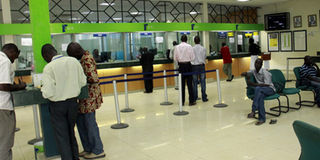Plan to integrate cash deals in EAC unveiled

Kenya Commercial Bank in Juba, South Sudan. PHOTO | FILE |
What you need to know:
- Project aims at reducing the cost of doing business in bloc
- The East African Community (EAC) secretariat is scouting for consultants to undertake a regional financial services sector integration project with a view of establishing a single market.
- The initiative comes barely a month after EAC member states: Kenya, Uganda and Tanzania launched a cross-border payment system. This was meant to eliminate barriers to regional trade and enhance business.
East Africa’s financial services industry could soon operate as a single market.
The East African Community (EAC) secretariat is scouting for consultants to undertake a regional financial services sector integration project with a view of establishing a single market.
The EAC financial sector development and regionalisation project has received a Sh1.4 billion ($16 million) financing from the International Development Association, and is expected to start work sometime this year.
“The objective of the study is to carry out in-depth investigation on card switches on a regional level with an aim of promoting inter-operability in the EAC region,” the regional body said in a statement appearing in the press last week.
ONE MARKET
Industry analysts say this move is set to enhance efficiency and reduce transaction costs in the community’s financial services business.
“The regionalisation of the financial systems will effectively make the bloc operate as one market. There will be seamless financial transactions across border. For instance, transferring money from Nairobi to Kigali will be like transferring money from Nairobi to Nakuru,” Kenya Bankers Association chief executive Habil Olaka said on phone on Sunday.
The project will focus on among other things, the operation and regulation of payment cards, international cash transfer systems, consumer protection and public education, a study on EAC banking laws, regulation, supervision, and the information and communications technologies.
The initiative comes barely a month after EAC member states: Kenya, Uganda and Tanzania launched a cross-border payment system. This was meant to eliminate barriers to regional trade and enhance business.
Successful completion of the study will pave way for the establishment of a single market in financial services among EAC partner states: Kenya, Uganda, Rwanda, Tanzania and Burundi.
COST OF TRADE
“It could significantly bring down the cost of trade within the EAC by increasing efficiency in cross-border payment systems,” said Mr Danson Muchemi, chief executive of JamboPay, an electronic payments company.
It will also affect other financial services industries like the insurance, pension funds among others, whose operation in the region will be harmonised in such a way that transactions in one country will be the same as deals settled in member state.
In pension funds, for instance, one would be able to move with his/her balance to another jurisdiction within the EAC and continue from where they left without facing any hurdles or other lengthy and often sophisticated technicalities in the industry, Mr Olaka noted.
Analysts agree that the cost of installing the system will be high and the risk associated with the sector may increase, but the overall benefits in efficiency and costs outweigh the initial input demands.





